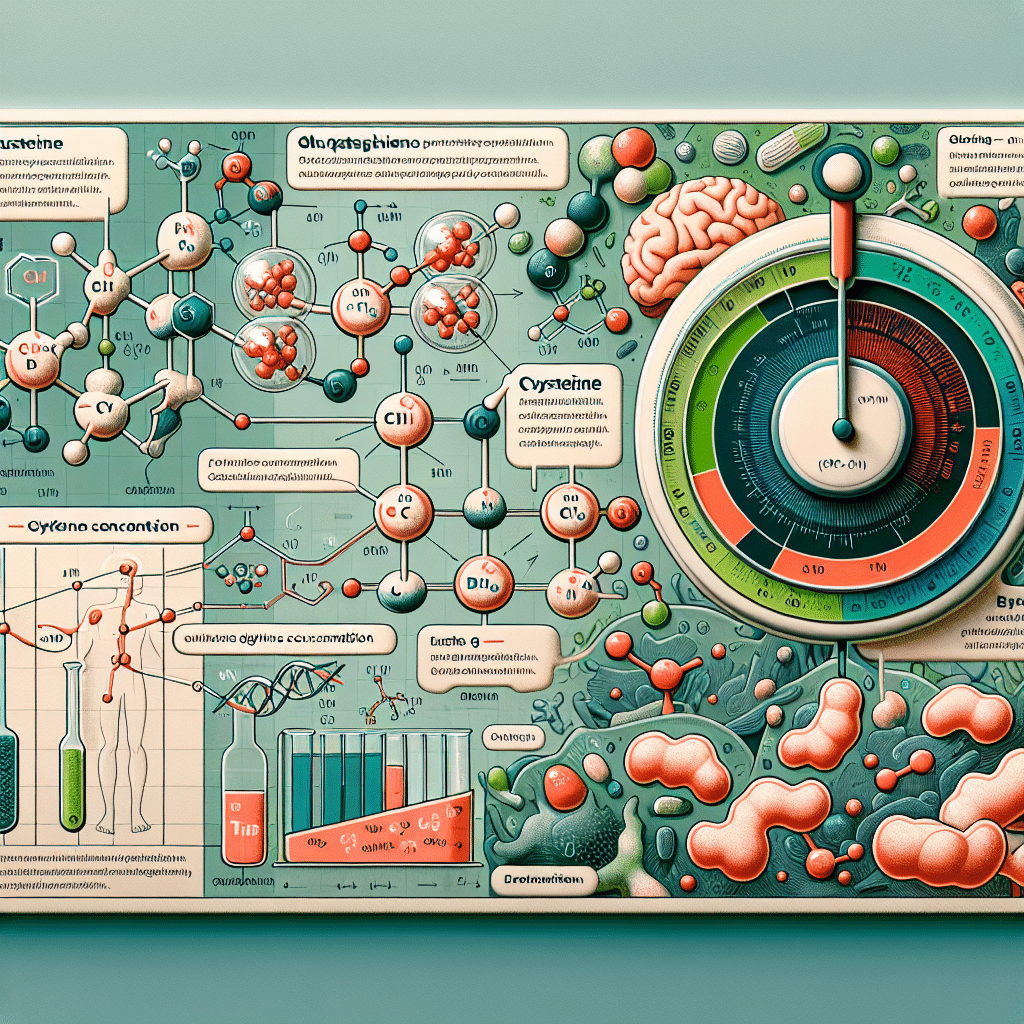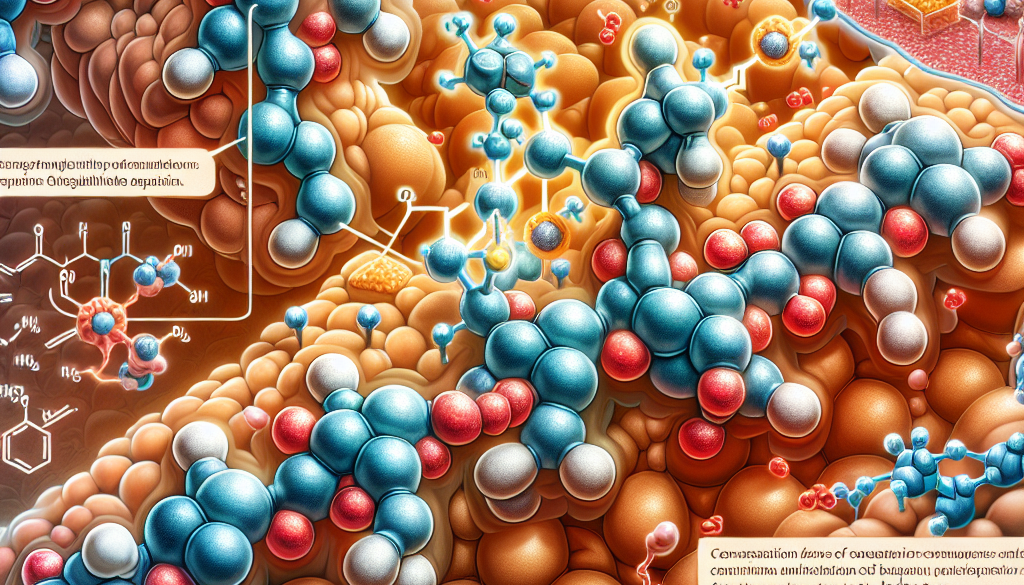Cysteine Glutathione Concentration: Explained
-
Table of Contents
- Cysteine Glutathione Concentration: A Comprehensive Guide
- Understanding Glutathione and Its Functions
- The Role of Cysteine in Glutathione Synthesis
- Factors Affecting Cysteine and Glutathione Concentrations
- Measuring Cysteine and Glutathione Concentrations
- Boosting Glutathione Levels Through Cysteine Supplementation
- Glutathione and Disease Prevention
- Conclusion
- Discover ETprotein’s High-Quality Protein Products
Cysteine Glutathione Concentration: A Comprehensive Guide

Glutathione, often referred to as the “master antioxidant,” is a critical molecule in maintaining oxidative balance and overall health. Its concentration in the body is influenced by various factors, including the availability of its precursor amino acid, cysteine. Understanding the relationship between cysteine and glutathione is essential for appreciating the role of these substances in health and disease.
Understanding Glutathione and Its Functions
Glutathione is a tripeptide composed of three amino acids: glutamine, cysteine, and glycine. It is found in virtually every cell of the body and plays a pivotal role in a wide range of biological processes, including:
- Detoxification of harmful substances
- Protection against oxidative stress
- Regulation of the immune response
- Maintenance of mitochondrial function
- Modulation of cell proliferation and apoptosis
Due to its thiol (sulfhydryl) group, glutathione is an effective electron donor, which makes it a potent antioxidant. It neutralizes free radicals and other reactive oxygen species, thereby protecting cells from damage.
The Role of Cysteine in Glutathione Synthesis
Cysteine is the rate-limiting precursor in the synthesis of glutathione. This means that the availability of cysteine within cells largely determines the rate at which glutathione can be produced. Cysteine itself is derived from dietary sources or through the conversion of the amino acid methionine.
The body has several mechanisms to ensure an adequate supply of cysteine for glutathione synthesis:
- Dietary intake of cysteine-rich foods such as poultry, yogurt, egg yolks, red peppers, garlic, onions, broccoli, Brussels sprouts, oats, wheat germ, and sprouted lentils
- Conversion of methionine to cysteine through the transsulfuration pathway
- Recycling of glutathione to liberate free cysteine
Factors Affecting Cysteine and Glutathione Concentrations
Several factors can influence the levels of cysteine and glutathione in the body, including:
- Diet: A diet lacking in cysteine or methionine can lead to reduced glutathione synthesis.
- Metabolic Demand: Conditions that increase oxidative stress, such as illness, inflammation, or exposure to toxins, can deplete glutathione levels.
- Genetics: Genetic variations can affect the enzymes involved in glutathione metabolism, influencing individual levels.
- Age: Glutathione levels tend to decrease with age, which may contribute to the aging process and the development of age-related diseases.
Measuring Cysteine and Glutathione Concentrations
Assessing the levels of cysteine and glutathione in the body can provide valuable insights into an individual’s oxidative status and potential for disease. Techniques for measuring these concentrations include:
- Blood tests to measure total and reduced glutathione levels
- High-performance liquid chromatography (HPLC) for accurate quantification
- Magnetic resonance spectroscopy (MRS) for non-invasive measurement in tissues
These methods can help clinicians and researchers understand the balance of oxidative stress and antioxidant defenses in various health conditions.
Boosting Glutathione Levels Through Cysteine Supplementation
Given the importance of cysteine in glutathione synthesis, supplementation with cysteine or its derivatives, such as N-acetylcysteine (NAC), can be an effective strategy to boost glutathione levels. NAC has been used clinically to treat acetaminophen overdose, which depletes glutathione in the liver, and to support respiratory health.
Other strategies to increase glutathione levels include:
- Consuming foods rich in sulfur-containing amino acids
- Exercise, which can boost glutathione synthesis
- Avoiding excessive alcohol consumption, which can deplete glutathione
- Supplementing with other precursors and cofactors, such as selenium and vitamins C and E
Glutathione and Disease Prevention
Research has linked adequate glutathione levels to a reduced risk of several diseases, including:
- Chronic diseases such as heart disease, diabetes, and cancer
- Neurodegenerative diseases like Alzheimer’s and Parkinson’s disease
- Autoimmune diseases, due to its role in immune regulation
- Liver diseases, as glutathione is essential for detoxification
Maintaining optimal cysteine and glutathione concentrations is thus considered beneficial for overall health and longevity.
Conclusion
The concentration of cysteine and glutathione in the body is a critical factor in maintaining health and preventing disease. Cysteine is the rate-limiting precursor for glutathione synthesis, and its availability can be influenced by diet, metabolic demand, genetics, and age. Measuring and optimizing these concentrations can help enhance antioxidant defenses and support various aspects of health. Supplementation with cysteine or its derivatives, along with lifestyle modifications, can be effective strategies to maintain adequate glutathione levels.
Discover ETprotein’s High-Quality Protein Products
If you’re looking to support your health with high-quality protein products, consider ETprotein’s offerings. Their range of organic bulk vegan proteins and L-(+)-Ergothioneine (EGT) can help meet your dietary and supplementation needs. With a commitment to non-GMO, allergen-free products with high purity levels, ETprotein caters to industries such as nutraceuticals, pharmaceuticals, cosmeceuticals, and food and beverage. Enhance your health regimen with ETprotein’s trusted protein solutions.
About ETprotein:
ETprotein, a reputable protein and L-(+)-Ergothioneine (EGT) Chinese factory manufacturer and supplier, is renowned for producing, stocking, exporting, and delivering the highest quality organic bulk vegan proteins and L-(+)-Ergothioneine. They include Organic rice protein, clear rice protein, pea protein, clear pea protein, watermelon seed protein, pumpkin seed protein, sunflower seed protein, mung bean protein, peanut protein, and L-(+)-Ergothioneine EGT Pharmaceutical grade, L-(+)-Ergothioneine EGT food grade, L-(+)-Ergothioneine EGT cosmetic grade, L-(+)-Ergothioneine EGT reference grade and L-(+)-Ergothioneine EGT standard. Their offerings, characterized by a neutral taste, non-GMO, allergen-free attributes, with L-(+)-Ergothioneine purity over 98%, 99%, cater to a diverse range of industries. They serve nutraceutical, pharmaceutical, cosmeceutical, veterinary, as well as food and beverage finished product distributors, traders, and manufacturers across Europe, USA, Canada, Australia, Thailand, Japan, Korea, Brazil, and Chile, among others.
ETprotein specialization includes exporting and delivering tailor-made protein powder and finished nutritional supplements. Their extensive product range covers sectors like Food and Beverage, Sports Nutrition, Weight Management, Dietary Supplements, Health and Wellness Products, and Infant Formula, ensuring comprehensive solutions to meet all your protein needs.
As a trusted company by leading global food and beverage brands and Fortune 500 companies, ETprotein reinforces China’s reputation in the global arena. For more information or to sample their products, please contact them and email sales(at)ETprotein.com today.














